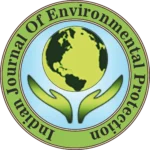IJEP 42(4): 451-456 : Vol. 42 Issue. 4 (April 2022)
Perini Praveena Sri*
Atria Institute of Technology, Atria Centre for Management and Entrepreneurship, Bangalore- 560 024, Karnataka, India
Abstract
The foremost contribution and aim of the paper are to investigate the likelihood of thermal air pollution vulnerabilities in a selected sample thermal power station of India (NTTPs), at the regional level as an exemplary. The paper climaxes the stringent decision making of Centre and State through the stricter implementation of legal and regulatory frameworks with its synergetic efforts of various amenabilities. The remainder of the paper is organized as follows: (a) to emphasize long term environmental management anomalies in selected thermal power stations through descriptive statistical analytical tools and (b) to present the empirical results of addressing the regional issue of environmental – climate-related challenges of thermal power plants with perseverance-based policy recommendations through a robust focus on material economics.
Keywords
Thermal pollutants, Circular economy, Narla Tata Thermal Power Station
References
- Schoenbrod, D. 1983. Limits and dangers of environmental mediation: A review essay. New York Law School.
- Bocken, N.M.P., et al. 2016. Product design and business model strategies for a circular economy. J. Indus. Prod. Eng., 33(5): 308-320.
- Behrens, A. 2016. Time to connect the dots: What is the link between climate change policy and the circular economy? CEPS Policy Brief No. 337, CEPS, Brussels.
- Painter, A. 1988. The future of environmental dispute resolution. Natural Res. J., 28(1): 145-170.
- Perini, P. 2010. Econometric approach to water use estimation in power plants. Indira Gandhi Institute of Development Research, Mumbai.
- ADR. 2009. ADR lessons from the European energy industry: Alternative dispute resolution in the energy sector. Assoc. Int. Arbitration: Dispute Resolution J., 64(3): 89-91.
- Accenture. 2014. Circular advantage: Innovative business models and technologies to create value in a world without limits to growth. Sharing Cities Alliance.
- Available at www.eaber.org/document/econometric-approach-to-water-use-estimation-in-power-plants.
